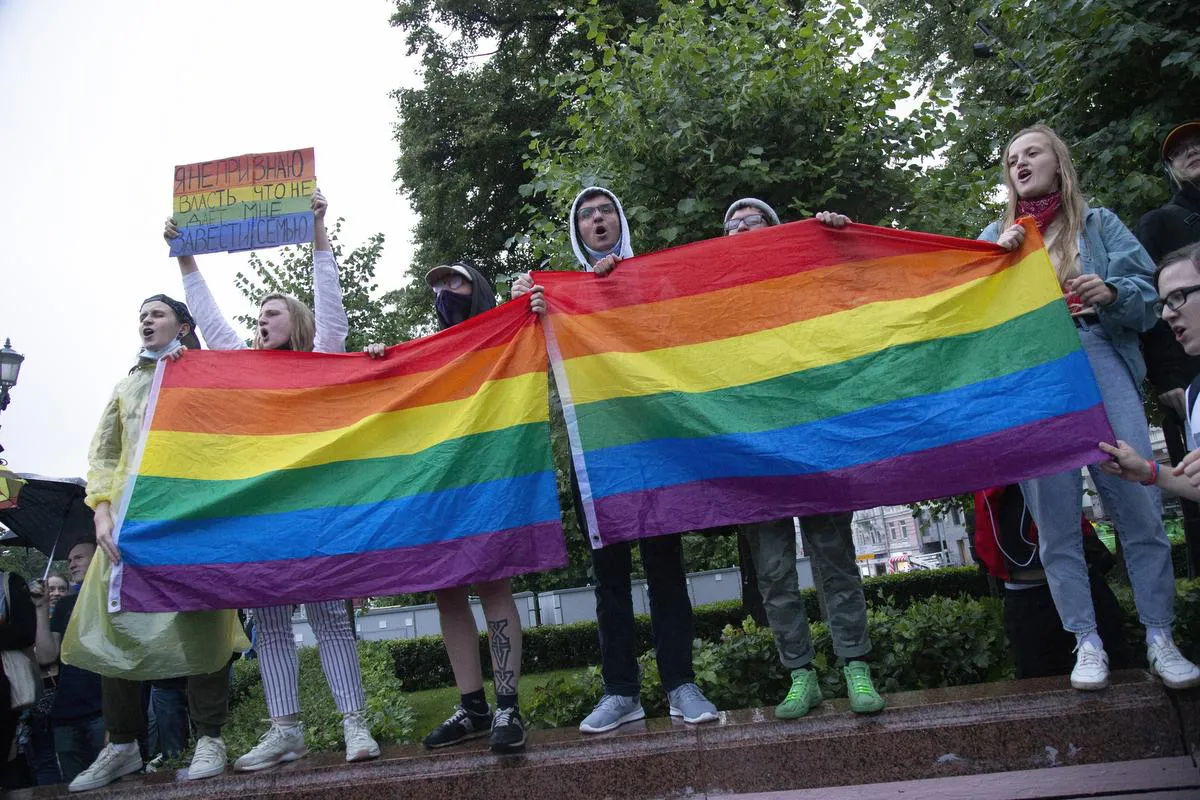:format(webp)/https://www.thestar.com/content/dam/thestar/opinion/contributors/2022/12/05/anti-gay-tweets-from-russian-embassy-show-canada-must-step-up-on-global-lgbtq-rights/russia_lgbtq_1.jpg)
In late November, Russia’s embassy in Ottawa launched a diplomatic firestorm after getting into a Twitter battle with three gay federal cabinet members: Tourism Minister Randy Boissonnault, Sport Minister Pascale St-Onge and Labour Minister Seamus O’Regan.
The embassy, responding to global criticism of a new Russian anti-LGBTQ law, decided to come out swinging with a tweet of a crossed-out rainbow Pride flag that stated a family is only “a man and a woman and children.” After the ministers responded, the Russian embassy continued, with messages targeting St-Onge in particular.
In reply, Foreign Affairs Minister Mélanie Joly summoned Russian ambassador to Canada Oleg Stepanov, the diplomatic equivalent of a finger-wagging.
This incident reminds us that the wave of anti-LGBTQ sentiment around the world is growing, and Canada should step up and show leadership on the international stage. Whether the attacks originate from governments or from vigilantes engaging in acts of violence, the rights and safety of LGBTQ people are being threatened all over the world. Canada can do much more than respond via a few tweets and a diplomatic slap on the wrist.
Of course, there is no place in the world with complete equality for LGBTQ people — including Canada, where work remains to protect our community’s human rights. But 67 countries still criminalize same-sex relations, including 11 that impose the death penalty. Countries like Russia, which at one time were moving forward on LGBTQ human rights, are now rolling backwards with severe crackdowns, exacerbating the existing LGBTQ refugee crisis. Authoritarian regimes are assaulting LGBTQ human rights in many countries, and online hatred is spreading across borders.
Russia just passed new legislation which expands upon previous anti-LGBTQ laws, with fines for talking about LGBTQ people in books or films. In Qatar, the FIFA World Cup has raised awareness of that country’s anti-LGBTQ laws, which stipulate up to three years in prison for homosexuality.
Last month, five people were murdered in a gay club in Colorado, a hate crime that may be connected to growing and unchecked online hatred against LGBTQ communities. In Ghana and Uganda, anti-homosexuality bills are back on the agenda, with proposed legislation that would further criminalize LGBTQ people with harsh new punishments and imprisonment.
In a digitized, globalized world, the rise of anti-LGBTQ hatred and misinformation is interconnected — and Canada must play a greater role in the world to combat this.
While Canada has begun integrating support for human rights for LGBTQ people into foreign policy, these efforts need more attention. Dignity Network Canada, the organization I work for, recently convened 150 LGBTQ human rights defenders from around the world in Ottawa to discuss ways that Canada can show support. Led by activists working on the front lines from Uganda to Peru to Ukraine, they had plenty of suggestions for Canada.
Some of the ideas discussed are not novel:
- First, they called for increased support for LGBTQ communities within humanitarian aid and international development assistance. At the moment, less than 0.2 per cent of total international aid from Canada is dedicated to advancing LGBTQ human rights.
- Second, they called on Canada ensure that no international aid goes to organizations promoting anti-LGBTQ agendas abroad.
- Third, advocates called for a clear strategy on how Canada will work with other like-minded countries to co-ordinate efforts to combat hatred and support countries making positive steps forward.
- Fourth, a key call has been to appoint an ambassador or special envoy to co-ordinate and lead Canada’s role in the world on LGBTQ human rights issues — something other countries such as Argentina, the U.S., U.K., France and Italy have done recently.
- Finally, Canada must create dedicated new pathways to safety for LGBTQ human rights defenders who are at risk and have to leave their countries.
These are tangible and concrete ways that Canada can put its weight behind our words.
As a country committed to equality and human rights, we can and must do more to support LGBTQ rights on the global stage. We must work together, step up our support to communities under attack, and push back against this rising tide of fear and hate.








